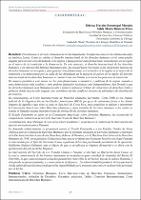Caso Domitila C.
Fecha
2019Autor
Berastegui Morales, Oderay Haydee
Romero Pérez, Saida María
Metadatos
Mostrar el registro completo del ítemResumen
Human rights activism has undergone important transformations in recent decades in Latin America. As is well known, international human rights law served as a cornerstone to resist dictatorships in the region, and to generate structural transformations in the region in the framework of the transition to democracy. In this context, international human rights law, and especially the Inter-American System, was crucial to react to the massive violations of human rights in the region and to generate structural transformations in the region in the framework of the transition to democracy by the fall of dictatorships in most countries of the region. The international law of human rights thus becomes the external limit of the transition processes.
Parallel to this new role, the economic and political transformations of the region, together with more stable democracies and more independent national judicial powers, have led to human rights being called not only to provide justice to victims of human rights violations. civil and political rights where it has been denied, but also to decide social conflicts of identity and distribution of resources.
Consequently, the Inter-American Court of Human Rights (acronym: I / A Court HR) is that judicial organ of the Organization of American States (OAS) that enjoys autonomy vis-à-vis the other organs of the Organization and that has its headquarters in San José de Costa Rica, whose purpose is to apply and interpret the American Convention on Human Rights and other human rights treaties to which the so-called inter-American system for the protection of human rights is submitted.
The Panamanian State is a party to the American Convention on Human Rights, has recognized the contentious jurisdiction of the Inter-American Court of Human Rights, has been processed by it, and then we will make a brief analysis of those five judgments in which Panama has been sanctioned by violate human rights.
Mrs. Domitila C. jointly claims the Panamanian State and the United States of America before the Human Rights Commission for the alleged violation of Human Rights contained in the American Declaration of the Rights and Duties of Man and in the Universal Declaration of Human Rights of 1948; to their detriment Violations that originate in the historical context in which Panama is intervened by the American Army, at the request of the newly proclaimed president of the opposition, Guillermo Endara Galimani, after the aim of eradicating the dictatorial regime and giving with the apprehension of the head of said Regime.
The intervention of the United States Army in Panama was under Operation Just Cause, in which as a result of the detonated bombs, a large number of homes in Barrio El Chorrillo were unloaded, causing the death of many Panamanians, among them the of the minor, son of Mrs. Domitila, and she loses her left leg, and as a result of shooting. Mrs. Domitila product of the lived experience suffered emotional affectation that has made it impossible to procreate as well as in her personal development, which forced her to live under the protection of her parents.

